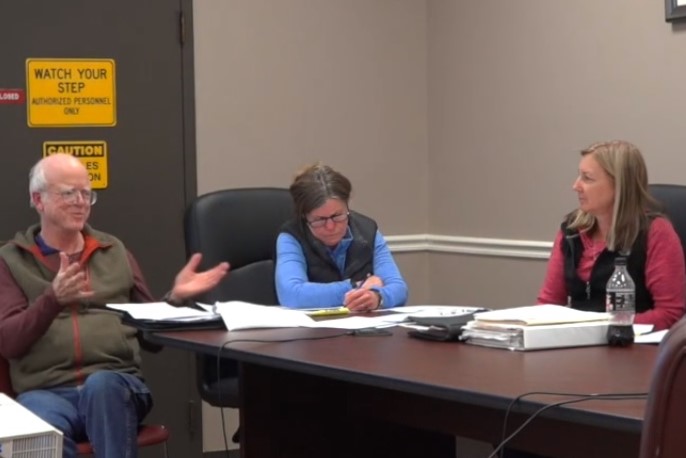The Boothbay Harbor Planning Board Advisory Workgroup met Monday, Feb. 12 to discuss a series of inquiries with the Department of Environmental Protection’s Bureau of Land Resources officer Colin Clark. Clark, who works out of Augusta with shoreland zoning, cleared up some of the workgroup’s uncertainties which include setbacks from the high water mark and possible setback reductions in exchange for town priorities and development of district-specific “greatest practical extents.”
With 75 feet being the number the DEP demands in shoreland zoning, Clark said that after walking most of the marine and water-dependent district, he could see that a 25-foot setback would likely be appropriate given the data and argument to support it. He also stressed it would be a favorable move for the town to make only if it has the backing and support of the town.
A spreadsheet with data, for example, would normally come in with an application to reduce the setback.
“We need to see some evidence of why you think you should get there,” said Clark. “(Town support is) another important factor. It isn’t about property owners and things of that sort – it is ‘What does your community want as a whole, what do your voters want as a whole?’ And that’s where you get your regulations moving forward.”
Clark clarified that the DEP’s position on shoreland zoning is essentially to take nonconforming structures and move them back. Economically, he said it is also important not to overdevelop as that would decrease property values. Clark said this does not happen frequently in coastal towns, but China Lake is the classic example of over-development and unforeseen naturally occurring hazards (algae bloom) pushing down the prices of property and, thus, demand.
Clark said the DEP’s position on structures over the water, abutting the water, or nonconforming to shoreland zoning or DEP-approved town ordinances is that if it comes down, it cannot go back up. He stressed that anything which might be at risk of needing rebuilding or 50 percent or more of its value rebuilt should be maintained and treated like the commodity it may be to locals or property owners.
Lincoln County Planner Bob Faunce asked about setback reductions in exchange for priorities such as reducing pavement and introducing more green space.
“No,” said Clark. “I’ve never seen a situation where somebody negotiates vegetation for dwelling inside the setback, a structure itself … Have people taken, say, random impervious surfaces and made them green with rooftop gardens or anything that could be applied to such an area? Absolutely … but it just isn’t negotiated credit for that. If it’s a 25 feet setback, that’s the line. I mean, you gotta draw the line somewhere.”
Though there is a credit through the DEP under the stormwater law considering a property’s level of impervious surface, it would not apply to properties in the shoreland zone, explained Clark. “If it’s not green, it doesn’t count.”
Clark said the biggest problem which tends to bind a community up on shoreland zone regulations is the greatest practical extent review, which, in his experience, has seen towns approving projects the DEP has taken issue with.
Gorrill Palmer’s project planning manager Dan Bacon asked Clark if he has ever seen towns develop extra guidance concerning specific districts, saying it seems like a subjective standard on a case by case basis which provides uncertainty for prospective developers.
“Let’s turn the question around,” said Select Boatd Chair Bill Hamblen. “Suppose the town came up with additional criteria to evaluate the greatest practical extent for this district. Would the DEP have a problem with that provided it isn’t paving over the world and is consistent with protecting the resource?”
Clark said the DEP would consider all amendments, but the big question would be whether or not it is more or less restrictive than the guidelines. If the amendments are more or equally as restrictive, then the DEP would allow it.
Code enforcement officer Geoff Smith said a pre-purchase conversation can always be scheduled and plans can always be brought to the planning board for feedback.
Said Smith, “There are easy arguments for these properties. I don’t see any rationale for making special standards to reviewing greatest practical extents for these three properties for this zone … We’re not going to make you take up parking because you’ve got to have parking. We’re not going to make you take up fire staging areas because you’re required to have fire staging areas. We’re not going to make you build over the right-of-ways for sewer and water lines because you can’t.”
The workgroup meets next at 7 p.m. Wednesday, Feb. 28 in the town office.
This meeting will be available online courtesy of Boothbay Region Television (BRTV). Tune in on Channel 1301.































